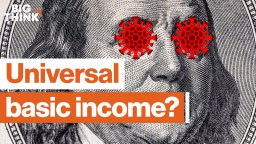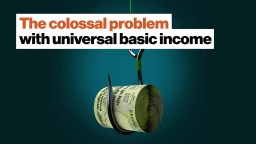universal basic income
The survey, performed by Morning Consult and commissioned by Amazon, found a majority of those job seekers want to move into new industries to stay relevant.
The American economy may be locked into an unhealthy cycle that only benefits a select few. Is it too late to fix it?
▸
19 min
—
with
COVID-19 may strengthen the case for universal basic income, or an idea like it.
▸
24 min
—
with
The pandemic has given us an early glimpse at how truly disruptive the fourth industrial revolution may be, and the measures we’ll need to support human dignity.
Continuing the countdown, Big Think’s seventh most popular video of 2019 explains why universal basic income will hurt the 99%, and make the 1% even richer.
▸
5 min
—
with
How does the largest welfare program imaginable have libertarian supporters?
The 2020 presidential candidate said companies like Amazon should “pay their fair share” as automation begins to displace human workers.
Tax megacorps like Amazon to fund universal basic income, says 2020 presidential candidate Andrew Yang.
▸
5 min
—
with
Here’s why universal basic income will hurt the 99%, and make the 1% even richer.
▸
5 min
—
with
Being on shaky financial footing is making Americans dumber.
▸
4 min
—
with
In Australia, the idea of a universal basic income has floated in and out of our political arena for years, but remains only that, an idea.
In ten years, everything could be very different… while on the surface being as recognizable as possible.
▸
35 min
—
with
Should there be a ceiling to the ambitions of Silicon Valley? It seems like a decisive “no,” according to the people who want to build new societies online, atop the ocean, and on Mars.
We are on the verge of the ‘Total Work’ dystopia, a prediction first made in 1948. Can Universal Basic Income wake us from our stupor?
▸
8 min
—
with
A.I. will bring a series of social and financial changes, and it will force us to confront a problem we’ve been avoiding for much too long, says Joscha Bach.
▸
5 min
—
with
What did Nikola Tesla or Bertrand Russell think of fewer working hours? Can a good life only come from work — and if so how much of it, and what kind?
Can’t the U.S. be a little more like Scandinavia in its ethos? Fixing inequality in America will take more than economic reform, it will also need a cultural shift.
▸
5 min
—
with
Universal Basic Income (UBI) and the movement towards a shorter work week is not just a solution to inequality, but one also aimed at stabilizing the environment.
Universal Basic Income an expensive system to be sure, but social justice commentator Eva Cox argues that the societal returns will be worth the investment.
A universal basic income (UBI) policy could change how we evaluate the meaning and quality of work in our society.
Louise Tarrant argues less work is not weakness, but a sign of prosperity and a necessity to the coming automation.
Let’s not let the prospect of a little free money stop us from pursuing more progressive regulations and reforms.
People like Thomas More, Abraham Lincoln, Franklin Roosevelt, and Bertrand Russell have already had many of the arguments we’re having about basic income today.
Dr. Elise Klein wants to point out the conversations we’re having around Universal Basic Income (UBI) aren’t new. Great leaders and thinkers Thomas Paine, Abraham Lincoln, Franklin Roosevelt, and Tony Atkinson have already had many of the arguments surrounding UBI, today. Its history bears repeating.
Elon Musk shared his thoughts on the future of jobs and the government’s role in a rapidly changing society.
It’s time we talked about working less. While some argue that we shorten the working week, others favor cutting out pointless, time-filler jobs altogether.
























